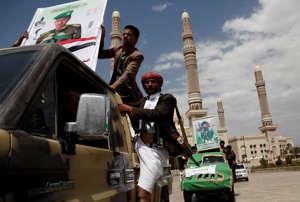An overview of the World Bank projects and results in Yemen - April 2021


THE WORLD BANK IN YEMEN
The World Bank has been an active partner in Yemen’s development for more than four decades. This long-standing working relationship has helped the Bank to continue supporting the Yemeni people and the institutions that serve them throughout the past six years of conflict.
Yemen has struggled with critical development challenges for longer, but the conflict has deteriorated the situation into a full-blown crisis. The Bank’s emergency program provides vital support to Yemeni families and their communities across the country, helping them cope with the impact of the crisis through cash transfers and other income support, enhancing access to health, nutrition and education services, scaling up cholera response, and reviving agriculture production.
To implement its program, the Bank has forged extraordinary operational partnerships with key United Nations (UN) agencies and local organizations. By leveraging these, it aims to preserve the capacity of Yemeni institutions—now and for the future—to deliver basic services that millions of Yemenis rely on.
THE YEMEN COUNTRY ENGAGEMENT NOTE
With peace uncertain, Yemen faces the prospect of continued conflict and a growing number of adverse humanitarian, institutional, social, and economic effects. Amid this, the World Bank approved a Country Engagement Note (CEN) to guide its support to Yemen over the period FY20–21:
The CEN focuses on two strategic objectives: Preserving basic services and the institutions that deliver them; and supporting people’s livelihoods and the potential for economic recovery.
Priorities include institutional capacity, improving service delivery, especially in health,
WASH, education, and social protection, and providing support to conflict-affected vulnerable Yemenis.
Food security is addressed through a multi-pronged approach targeting household income, agricultural production and productivity, farmers’ access to markets, nutrition enhancing practices, and food security management.
Recognizing the importance of youth and women to stability, prosperity, and human development, the CEN pays specific attention to their needs and to enhancing their role in peacebuilding and recovery.
Protecting human capital and harnessing private sector solutions is at the heart of the CEN, in line with the Bank’s regional Middle East & North Africa (MENA) strategy.
The World Bank is deepening its use of Advisory Services and Analytics to support ongoing projects, inform strategic adjustments, and ensure preparedness for future investments in recovery and reconstruction.

Paris — The French humanitarian organization Acted announced that it has delivered cash assistance to nearly 89,000 people affected by displa…

Sana’a — Fuel and food imports into ports under the control of Yemen’s Houthi movement on the Red Sea have continued to fall for…

ADEN — Yemen Airways, the country’s national carrier, announced it will resume flights between Aden and Abu Dhabi beginning in January…